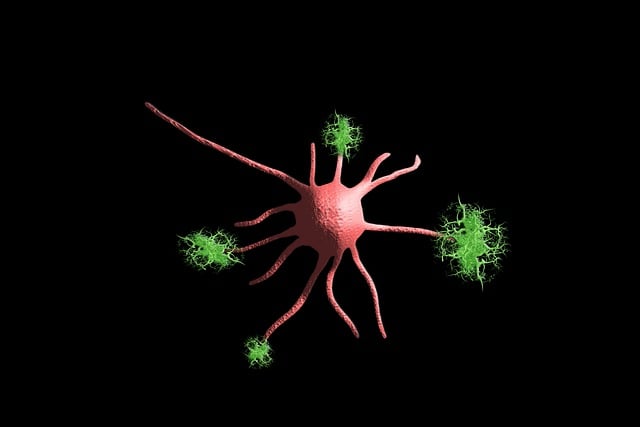The Endocannabinoid System (ECS) is a complex network vital for maintaining internal balance in our bodies, regulating key processes like mood, memory, pain, appetite and immune function. Disruptions in the ECS have been linked to health issues. Understanding this system – discovered while studying marijuana's effects – is crucial for harnessing its potential benefits through both natural means (diet, exercise) and innovative treatments, as research continues to reveal its significance in overall well-being.
The Endocannabinoid System (ECS) is a complex network that plays a pivotal role in maintaining physical and mental health. This intricate system, comprised of endocannabinoids, receptors, and enzymes, acts as a regulator, keeping our bodies in balance. Unveiling the mysteries of the ECS offers profound insights into our well-being. From its involvement in pain management to mood regulation, this article delves into the essential functions of cannabinoids, exploring how they contribute to overall health. By understanding the ECS, we can uncover natural remedies and lifestyle changes to promote harmony within our bodies.
Unveiling the Endocannabinoid System: A Complex Network

The Endocannabinoid System (ECS) is a complex network within our bodies that plays a pivotal role in maintaining homeostasis, or balance. It’s named after the cannabis plant, despite not being directly related to it; scientists discovered its existence while studying the effects of marijuana. The ECS consists of endocannabinoids, which are neurotransmitters produced by our bodies, receptors located throughout various organs and tissues, and enzymes that break down endocannabinoids once they’ve performed their functions. This intricate system regulates a wide range of physiological processes, including mood, memory, pain sensation, appetite, and immune function.
Understanding the ECS is crucial in comprehending how cannabis interacts with our bodies. When exogenous cannabinoids, like those found in marijuana, bind to ECS receptors, they can modulate this delicate balance, leading to various effects on both physical and mental states. By shedding light on the ECS, ongoing research into this fascinating system promises to unlock new insights into human health and disease, potentially paving the way for innovative treatments and a deeper appreciation of our body’s natural regulatory mechanisms.
The Role of Cannabinoids in Regulating Homeostasis

The Endocannabinoid System (ECS) is a fascinating and intricate network within our bodies that plays a pivotal role in maintaining homeostasis, or balance. It acts as a regulator for various physiological processes, ensuring they function optimally and harmoniously. At its core, the ECS involves endocannabinoids, which are endogenous lipids that bind to specific receptors in our brains and bodies. These receptors, CB1 and CB2, are part of what makes up the ECS.
Cannabinoids, both exogenous (like those found in cannabis) and endogenous, interact with this system by binding to these receptors. This interaction can have profound effects on mood, memory, pain perception, appetite, and even immune function. By influencing the activity of neurons and other cells, cannabinoids help keep everything from heart rate to inflammation in check, all of which are essential components of maintaining a state of balance within our bodies. Understanding the ECS and its delicate interplay with cannabinoids is key to unlocking the potential benefits for both physical and mental health.
Balancing Act: How ECS Maintains Physical and Mental Health

In today’s fast-paced world, maintaining a delicate balance between physical and mental well-being is an ongoing challenge. This is where the Endocannabinoid System (ECS) steps in as a pivotal regulator. The ECS is a complex network of endocannabinoids, receptors, and enzymes that play a crucial role in modulating various physiological processes, including mood, memory, appetite, and pain perception. Understanding the ECS is key to unlocking its ability to maintain balance within our bodies.
By interacting with the ECS, external compounds like cannabis can influence these processes. For instance, cannabinoids found in cannabis interact with ECS receptors, potentially offering relief from stress, anxiety, and chronic pain—all of which contribute to mental and physical health imbalances. This interaction highlights the ECS’s significance in maintaining homeostasis, ensuring our bodies operate harmoniously.
Exploring the Impact of Cannabis on ECS Function

The impact of cannabis on the human body has been a topic of growing interest, especially with the increasing legalization and acceptance of its use. A key system that cannabis significantly influences is the Endocannabinoid System (ECS), which plays a crucial role in maintaining balance within our bodies. The ECS is a complex network of receptors, enzymes, and endocannabinoids that regulate various physiological processes, including pain perception, appetite, mood, memory, and immune function.
Cannabis contains compounds known as cannabinoids, the most well-known being THC (tetrahydrocannabinol) and CBD (cannabidiol). When consumed, these cannabinoids interact with the receptors in the ECS, modulating their activity. For instance, THC binds to CB1 receptors in the brain, leading to feelings of euphoria and altering perception, while CBD interacts with a range of receptors, potentially offering therapeutic effects without the psychoactive properties of THC. Understanding this intricate dance between cannabis compounds and the ECS is vital for appreciating how cannabis can both disrupt and restore balance in the body.
Understanding Endocannabinoid Receptors: CB1 and CB2

The endocannabinoid system (ECS) is a complex network of cell receptors, endocannabinoids, and enzymes that plays a crucial role in maintaining balance within our bodies. At the heart of this system are endocannabinoid receptors, which act as molecular locks that bind with endocannabinoids, the body’s own natural compounds that regulate various physiological processes. Two of these receptors stand out: CB1 and CB2.
CB1 receptors are primarily found in the brain and central nervous system, while CB2 receptors are more abundant in immune cells and peripheral tissues. These receptors have distinct functions but work together to maintain homeostasis—the body’s internal balance. When endocannabinoids bind to these receptors, they can modulate pain perception, appetite, memory, mood, and inflammation, among other essential processes, ensuring the body operates smoothly and harmoniously.
Signaling Pathways: Unlocking the Communication within the Body

Maintaining balance, or homeostasis, is a complex process deeply rooted in our body’s intricate communication systems. One such system that plays a pivotal role is the Endocannabinoid System (ECS), which acts as a master regulator of various physiological processes. This system consists of endocannabinoids, receptors, and enzymes that work together to maintain equilibrium, ensuring everything from appetite and pain perception to mood and memory functions runs smoothly.
Signaling pathways within the ECS are like a sophisticated language that allows different cells and organs to communicate. Endocannabinoids, produced by our bodies, act as messengers that bind to specific receptors on cell membranes. This binding triggers a series of responses, initiating a feedback loop that helps keep internal environments stable. By understanding and harnessing this remarkable system, we can gain valuable insights into maintaining balance and promoting overall well-being.
Disruptions in the ECS: Potential Imbalances and Their Effects

The Endocannabinoid System (ECS) is a complex physiological system that plays a vital role in maintaining homeostasis, or balance, within our bodies. Comprised of endocannabinoids (natural compounds), receptors, and enzymes, it regulates various processes, including mood, memory, appetite, and pain sensation. Understanding the ECS is crucial as disruptions in this intricate system can lead to potential imbalances with far-reaching effects on overall health.
Imbalances in the ECS have been linked to numerous conditions, such as anxiety, depression, chronic pain, and inflammation. For instance, an overactive or dysfunctional ECS may contribute to heightened stress responses, impaired memory, and increased sensitivity to pain. On the other hand, deficiencies in endocannabinoids can disrupt normal physiological functions, leading to issues like reduced motivation, altered appetite regulation, and potential cognitive impairments. Recognizing these disruptions is essential as it allows for targeted interventions and potential treatments to restore balance within the ECS.
Natural Remedies and Lifestyle Changes for ECS Balance

Maintaining balance within the Endocannabinoid System (ECS) is crucial for overall health and well-being. The ECS plays a pivotal role in regulating various physiological processes, including mood, memory, pain perception, and inflammation. Understanding this intricate system allows us to explore natural remedies and lifestyle changes that can support its optimal functioning.
One of the key ways to promote ECS balance is through diet and nutrition. Incorporating foods rich in omega-3 fatty acids, such as fish, nuts, and flaxseeds, can help maintain healthy cell membranes within the body’s endocannabinoid receptors. Additionally, consuming a diverse range of fruits, vegetables, and herbs provides essential nutrients that support the production of endocannabinoids. Certain botanicals like turmeric, ginger, and cannabis (in its various forms) are known to interact with the ECS, offering potential therapeutic benefits for balance and homeostasis. Making lifestyle adjustments, such as regular exercise and stress management techniques, can also positively impact ECS regulation, fostering a harmonious internal environment.
Future Insights: Enhancing Our Understanding of ECS

As we continue to explore the potential of the Endocannabinoid System (ECS), future insights promise to enhance our understanding of its intricate role in maintaining balance within the body. Research is uncovering new connections between the ECS and various physiological processes, from immune response and pain management to mood regulation and sleep patterns. This evolving knowledge will likely lead to innovative strategies for leveraging the ECS to support overall well-being.
Understanding the Endocannabinoid System is key to unlocking these future advancements. By delving deeper into its mechanisms and interactions, scientists can develop more targeted interventions that work in harmony with the body’s natural systems. This promises not just treatment but a holistic approach to health and balance, tailored to individual needs.
